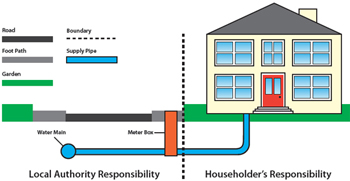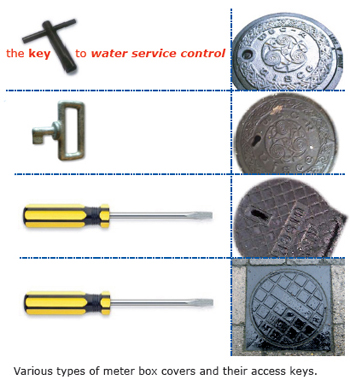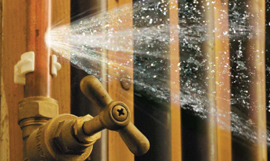Severe Cold Weather
- Other relevant links
- Water Services Contact Details
- Water Services Forms & Downloads
- Drinking Water Quality
- Public Notices
- Water Conservation
- Water Contamination
- Finding Leaks
- New Connections
- Severe Cold Weather
- Individual Well Grant
- Advice for Well Owners
- Group Water Scheme Subsidy
- Domestic Lead Remediation Grant
- Water Services Overview
- Multi Annual Rural Water Programme 2024-2026
All pipework within your property boundary is your responsibility. Many of the calls to Local Authorities during the last two extreme weather periods related to private frozen pipes. Galway County Council Water Conservation Unit wishes to advise all of its water customers to take actionnow, before the winter sets in, to prepare for extreme winter weather should it occur.

Remember: Any pipework within your house boundary is your responsibility, and spending a little time on simple frost protection now could help you avoid trouble and expense during cold weather.
Frozen pipes which burst when the thaw set in caused hundreds of thousands of Euro worth of damage to properties last winter. Some commercial and agricultural customers also saw a large increase in bills where leaks on their property were not identified and repaired quickly. Property owners should check with their insurers about what requirements they set down in relation to extremely cold weather in order for the property to remain insured.
WHAT YOU SHOULD DO NOW?
Find your stopcock, ensure that it is properly insulated and test that it is working. This is where the water to your property can be turned off and on. Some domestic houses have a stopcock under the kitchen sink, and all properties have a stopcock on the supply line from the council or group scheme watermain. Typically this is located just outside the property boundary wall, or on the footpath in front of the property. Your local plumbing provider will be able to supply you with the appropriate tool to turn on and off the stopcock. Some domestic and all commercial properties have an integrated meter and stopcock box.
The most common stopcock and meter box covers are shown below:

All of these boxes should contain a polystyrene plug under the lid to protect from frost. Please ensure that this is properly in place and if not, try to get one from your local plumbing provider. Any insulating material which does not hold water can be used to temporarily protect the stopcock & meter.
- If your pipe froze last winter, consider having your plumber replace the service pipe within your property boundary. The service should be buried at a depth greater than 600mm below ground level (if possible) – the deeper it is the more insulated it will be.
- Insulate any exposed pipework. Check around your home for areas where water supply lines are located and might be in unheated or un-insulated areas. Check the attic, crawl spaces, garages, under bathroom and kitchen cabinets. Remember attic insulation should go over your attic water storage tank, in order that heat from the house below can rise to keep the tank ice free.
- Farm owners – should seek to locate all pipework on their property. Any above ground pipework to troughs should be shut off and drained down when not in use.
- Holiday home owners or vacant property owners should either shut off the water supply and drain down the property water network completely or maintain a constant heating of the property to prevent freezing. Either way, you should organise to have the property checked on a daily basis during an extreme cold weather event.
All property owners should note that some heating systems require a constant top –up from the water supply and should not be operated when the property stopcock has been shut off /system drained down or the pipes have frozen. Contact your plumber to find out what sort of heating system you have in your property and how it operates.
What should be done during an extreme cold spell?
- Keep your heating running at a constant temperature 24/7 during the cold weather event.
- Where it will not be a hazard to pedestrians or traffic, try to insulate your stopcock or meter box by covering it with old carpet or mats, your bin, or even just parking a vehicle over it. All of these measures will provide some insulation.
- Where you think pipes in your attic might freeze, and it is safe to do so, open your attic trap door to allow warm air up into the attic space.
- Insulate and cover any outdoor taps as these are very prone to bursting.
- Farmers should ensure that all long services to troughs are closed off at the stopcock.
- Vacant properties should be checked on a daily basis, and should have constant heating or have the supply turned off and drained down.
- Do not run your taps, doing this results in water shortages for everyone.
- Check on elderly or unwell neighbours who might need assistance in obtaining water.
What should be done if your pipes freeze?
- If there is no water from the cold tap at your kitchen sink, it is likely that the supply pipe onto your property has frozen. Typically these freeze at the point at which the pipe enters the house (it is often shallow at this point) or at the stopcock although it may freeze at any other point which had been laid too shallow. You may be able to thaw a frozen stop cock by wrapping it in warm towels
- You may be able to thaw a frozen pipe in the attic or other exposed pipe by wrapping it in warm towels or using a hot water bottle. Do not use any device with a naked flame on pipes – it can cause the water in the pipe to boil and could burst explosively. Also be aware if using an electrical appliance to thaw pipes that if the pipe has burst that there could be a risk of electrocution when the pipe thaws.
- Check with Galway County Council about supply problems in your area. These will be advertised on regular local radio adverts and on the Galway County Council website.
- Once the thaw sets in or your supply is restored, make sure you check for any leaks or bursts which might have occurred.
WHAT SHOULD BE DONE IF YOUR PIPES BURST?
- Turn off your stopcock. Open your hot and cold taps and allow all of the water to drain out.
- Switch off your electricity supply at the mains if there is any risk of water coming in contact with electrical wiring or fittings.
- If you live in an apartment, terraced or semi-detached house, warn your neighbours in case the burst pipe causes flooding in their property. Check with your neighbours to ensure that it is only your own water supply that you have shut off.
- Contact your local qualified plumber to arrange to make repairs.



Find us
on Facebook
Follow us
on Twitter
Gaeilge
agus Fáilte